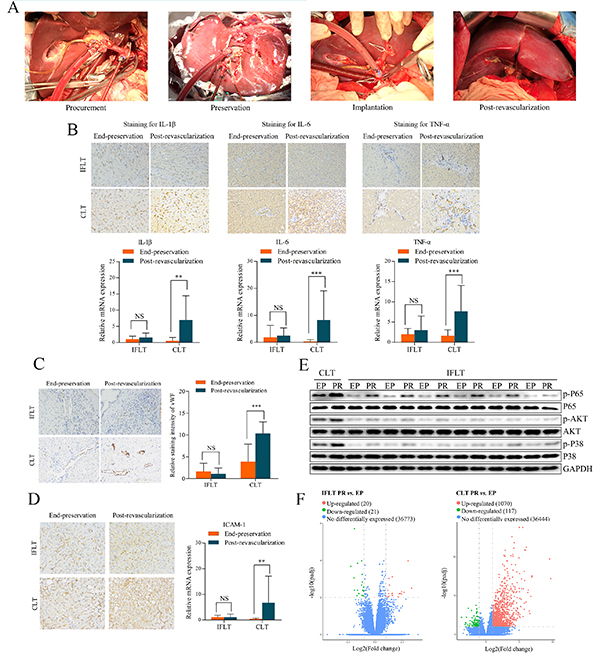Prevention of Graft Ischemia-Reperfusion Injury in Ischemia-Free Liver Transplantation
Organ Transplant Center, The First Affiliated Hospital of Sun Yat-sen University, Guangzhou, China
Meeting: 2019 American Transplant Congress
Abstract number: 75
Keywords: Graft function, Ischemia, Liver transplantation, Machine preservation
Session Information
Session Name: Concurrent Session: Ischemia Reperfusion & Organ Rehabilition I
Session Type: Concurrent Session
Date: Sunday, June 2, 2019
Session Time: 2:30pm-4:00pm
 Presentation Time: 2:30pm-2:42pm
Presentation Time: 2:30pm-2:42pm
Location: Room 313
*Purpose: Graft ischemia-reperfusion injury (IRI) is an inevitable event in organ transplantation, which often leads to a number of complications and even patient deaths. We aim to prevent IRI through the innovation of ischemia-free liver transplantation.
*Methods: IFLT involves surgical techniques and the use of normothermic machine perfusion to enable a continuous oxygenated blood supply to donor livers during procurement, preservation and implantation. We analyzed the perfusate and the biopsies of liver grafts of the first 14 cases of IFLT to assess the severity of IRI.
*Results: During the whole procedure of IFLT, the perfusion flow and pressure of the portal vein and celiac artery were stable. The liver grafts were functioning well with quick lactate clearance and continuous bile production. The metabolomic analysis showed active TCA cycling and ATP production throughout the procedure. The liver enzyme (AST and ALT) levels of the perfusate did not increase when compared to those in the serum of the donors. The Suzuki score, apoptotic hepatocyte numbers, pro-inflammatory cytokine (IL-1b, IL-6, and TNF-a) release, endothelium injury, inflammasome and pyroptosis activity of the liver grafts after reperfusion were not elevated in IFLT. In a sharp contrast, all these IRI-related markers were substantially elevated in the standard liver transplant procedure using static cold storage as a preservation method. Notably, the transcriptomic analysis showed that the expression of only 20 genes were significantly up-regulated and 21 genes were down-regulated in the IFLT group (14 cases), while 1070 genes were up-regulated and 117 genes were down-regulated in the control group (14 cases). The single cell sequencing analysis showed profound transcription reprogramming in different cell types in the control group, while no obvious transcription reprogramming occurred in the IFLT group.
*Conclusions: This study shows for the first time that IRI can be largely avoided in IFLT. A broader application of IFLT offers a brand new opportunity to optimize transplant outcomes and maximize donor organ utilization.
To cite this abstract in AMA style:
Guo Z, He X, Zhao Q, Huang S, Zhang Z, Wang L, Ju W, Chen G. Prevention of Graft Ischemia-Reperfusion Injury in Ischemia-Free Liver Transplantation [abstract]. Am J Transplant. 2019; 19 (suppl 3). https://atcmeetingabstracts.com/abstract/prevention-of-graft-ischemia-reperfusion-injury-in-ischemia-free-liver-transplantation/. Accessed March 1, 2026.« Back to 2019 American Transplant Congress

